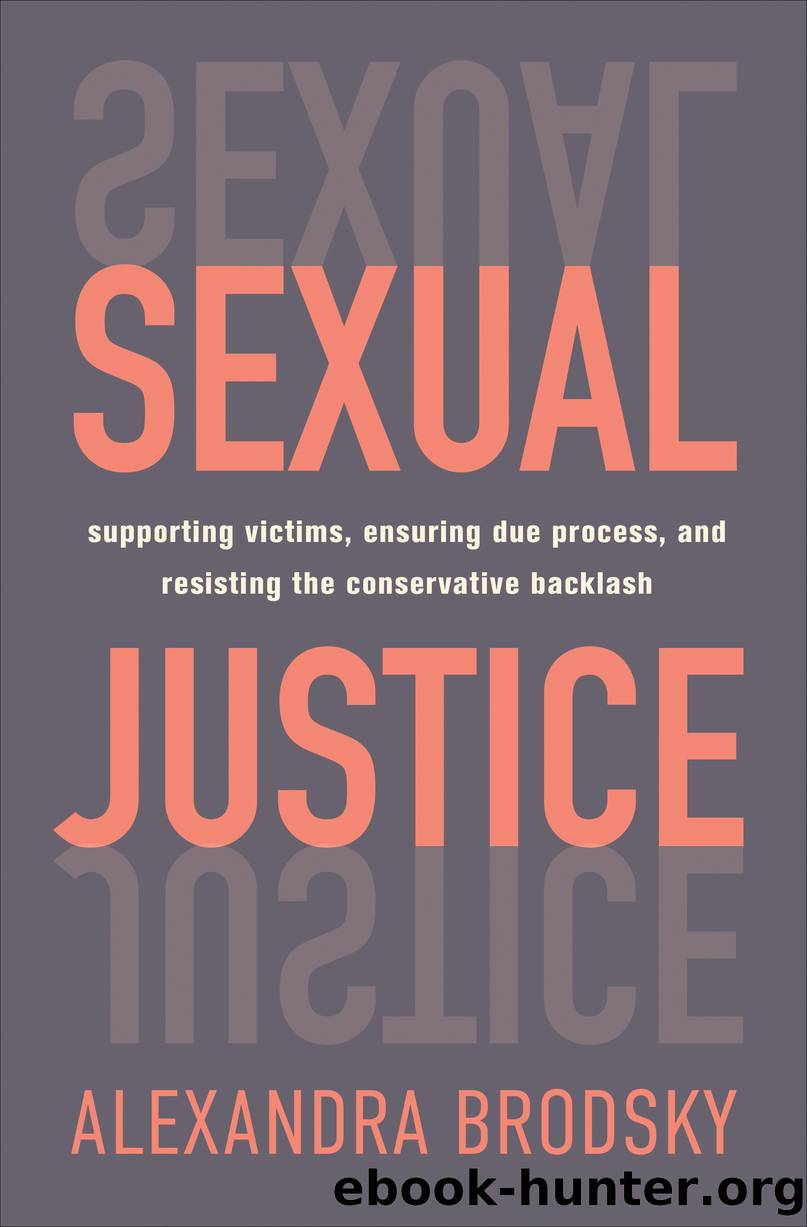Sexual Justice by Alexandra Brodsky

Author:Alexandra Brodsky
Language: eng
Format: epub
Publisher: Henry Holt and Co.
* * *
CRUCIALLY, DE-EXCEPTIONALIZING SEXUAL harassment as a matter of process does not require advocates to minimize the injuries it causes or the special role it plays in reinforcing inequalities. A few years ago, I shared my argument about exceptionalism at a conference. A feminist scholar told me she worried that my position suggested that sexual assault is no different than any other injury, such as, say, being punched. The message then might become that rape victims should just get over it, ignoring the unique forms of trauma sexual victimization carries. Perhaps some might read my push to de-exceptionalize to mean that there is no need for special civil rights protections for victims of sexual harassment.
But we can distinguish substance from process. I obviously think sexual harassment is hugely important; I have devoted most of my adult life to ending it. Not all victims find it life-changing, but many do. And I do think harassmentâs ramifications for individuals and society are more sweeping than is typical of the conflicts that institutions are often called on to resolve. We passed vital antidiscrimination civil rights laws precisely because these kinds of offenses really, really matter.
Yet none of the ways in which these offenses matter substantively require entirely separate procedures, so long as the âstandardâ process is thoughtful, sensitive, and fair. After all, race- and disability-based discrimination really matter, too, and their victims are guaranteed distinct civil rights protections. But those violations are not channeled into single-issue processes. Instead, institutions figure out how to protect race and disability civil rights within the same general procedure used for other interpersonal allegations. Courts, of course, do the same. Prosecutions for lethal hate crimes and for victimless fraud use the same process. So we as feminists can recognize the ways in which sexual harassment is a unique harm for victims and the world, while also deciding itâs wiser not to have it adjudicated through unique procedures.
None of this is to say that, as they stand today, all general disciplinary proceedings in schools and workplaces are well-equipped to respect the rights of victims. But there is no reason those proceedings canât be improved for everyoneâs sake. Similarly, while responses to sexual harassment certainly require more sensitivity than a dispute over a drunken fistfight might, this doesnât mean that they need an entirely separate process. Rather than set up one thoughtful process and one obnoxious one, why not just create a single good track? Thereâs no reason, for example, to ever make a complainant submit to direct questioning by someone he has reported, regardless of the specific allegation. And plenty of disciplinary matters that are common in settings like schools and workplaces require sensitivity, training, and expertise. Without a doubt, I would want an HR professional who is investigating a groping allegation to have training to avoid re-traumatizing complainants and check her own biases. But the same goes for an investigator looking into racial harassment. Why not make sure every decision-maker is trained to address whatever set of
Download
This site does not store any files on its server. We only index and link to content provided by other sites. Please contact the content providers to delete copyright contents if any and email us, we'll remove relevant links or contents immediately.
The Borden Murders by Sarah Miller(3590)
The Secret Barrister by The Secret Barrister(3008)
Coroner's Journal by Louis Cataldie(2100)
Police Exams Prep 2018-2019 by Kaplan Test Prep(2032)
The Splendid and the Vile by Erik Larson(1781)
Terrorist Cop by Mordecai Dzikansky & ROBERT SLATER(1717)
My Dark Places by James Ellroy(1502)
A Colony in a Nation by Chris Hayes(1500)
Black Klansman by Ron Stallworth(1441)
A Life of Crime by Harry Ognall(1379)
Objection! by Nancy Grace(1329)
Whoever Fights Monsters by Robert K. Ressler(1322)
The New Jim Crow by Michelle Alexander(1316)
American Prison by Shane Bauer(1288)
Obsession (The Volkov Mafia Series Book 1) by S.E Foster(1276)
Anatomy of Injustice by Raymond Bonner(1268)
The Art of Flight by unknow(1265)
A Higher Loyalty by Comey James(1239)
A is for Arsenic: The Poisons of Agatha Christie (Bloomsbury Sigma) by Kathryn Harkup(1213)
